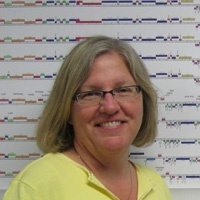Welcome to the forums at seaphages.org. Please feel free to ask any questions related to the SEA-PHAGES program. Any logged-in user may post new topics and reply to existing topics. If you'd like to see a new forum created, please contact us using our form or email us at info@seaphages.org.
Recent Activity
uOttawaPHAGE posted in frameshifts
Dan Russell posted in Congrats to Steve Caruso and Beth Wilkes — 2025 ASM Outstanding Instructor Award, Honorable Mention
ACMPhageHunters posted in Clarification Question About HNH Endonuclease Function Determination in view of hits to the Ref Sequences
cdshaffer posted in Clarification Question About HNH Endonuclease Function Determination in view of hits to the Ref Sequences
All posts created by debbie
| Link to this post | posted 29 Jan, 2026 16:31 | |
|---|---|
|
|
Hi Joe, This is tough to troubleshoot because of the inability to make changes in DNA Master's code right now. What version of Windows are you using? This is likely due to helper files from Windows. When did you last install/update DNA Master. Have you updated you computer since? I would recommend that you do a reinstall, using the Genomics Guide's set of directions, Section 2.5. Best, debbie |
| Link to this post | posted 27 Jan, 2026 19:34 | |
|---|---|
|
|
Hi Allison, In general, I would discourage using Blastp at ncbi for stat information. My rationale is this. Do not use any Ref Sequence data because it is not provided by the owner of the sequence. For most data outside of the SEA-PHAGES program annotations are done with automated software and does not follow the same scrutiny that we use. Finally having Starterator data (with 'raw' nucleotide alignments) surpasses alignments provided of called genes that have not gone though our scrutiny. As for the clustering part, again that is provided in Starterator. Also, matches to identical sequences doesn't provide much depth either. You are looking at same instances when they are identical, in which case whether you agree or not is a about whether 'we' agree' with each other, not how a sequence is conserved over time. The hits to non-actinobacteriophage data is of interest, but again what criteria was used to make that call, especially as it pertains to starts. There is some really nice data available at the ncbi hits that could also be investigated. LIke multiple seqeunce alignments. best, debbie |
| Link to this post | posted 23 Jan, 2026 19:48 | |
|---|---|
|
|
Hi Holly, The use of membrane protein has a long history, but currrently, it is not being posted at phagesDB. Instead the data is always available at phamerator.org in the drop down box of each gene and a button selection that shows all membrane proteins in the Genome Map Settings. However, this function is part of the GenBank file and PLEASE include them in your annotations. Best, debbie The historical perspective is that membrane protein (domain) is NOT a function, BUT knowing a gene has a membrane domain may help to identify function is surrounding genes. Hence, the data at Phamerator.org is most helpful! debbie |
| Link to this post | posted 22 Jan, 2026 19:00 | |
|---|---|
|
|
that is ok with me. best, debbie |
| Link to this post | posted 22 Jan, 2026 17:59 | |
|---|---|
|
|
Dave, It might be helpful to meet up on line and you can show me what is happening. Tomorrow would be better than today. best, debbie |
| Link to this post | posted 22 Jan, 2026 12:16 | |
|---|---|
|
|
Dave, You have to be signed into too seaphages.org to access. (It is the same as phagesDB). Did you see my file? debbie |
| Link to this post | posted 21 Jan, 2026 17:59 | |
|---|---|
|
|
DNA Master file. |
| Link to this post | posted 21 Jan, 2026 17:58 | |
|---|---|
|
|
Dave, Did you attend or watch Friday's Faculty Meeting? that might help you approach. https://seaphages.org/forums/topic/5861/ So it sounds like you did not open the file in anyway, but when DNA Master did, it had 1 less base. (I too run DNA Master on a virtual PC environment (Virtual Box) and have not encountered this. anyways… There is one other thing that you can try. After you open it in DNA Master, Export "Create Sequence from this entry only". click over to sequence and click "Raw". Did the sequence length change? Additionally, put the Bugatti.fasta file on the Desktop of your virtual machine. then Open it in DNAMaster from there. Very strange. I have auto-annotated Bugatti. See if this one is correct. Best, debbie |
| Link to this post | posted 21 Jan, 2026 16:54 | |
|---|---|
|
|
Hi Dave, This is not typically something that occurs in DNA Master. So my first question is how did you download the fasta file. Did you open it? Download it again, without opening it and open it in DNA Master using Open -> FastA Multiple Sequence file. Is the sequence length now 50451? Let me know and we can go from there. best, debbie |
| Link to this post | posted 13 Jan, 2026 18:01 | |
|---|---|
|
|
Hi Dave. I am on a Mac and I use Virtual Box, with Windows 11. debbie |


 30Kb
30Kb